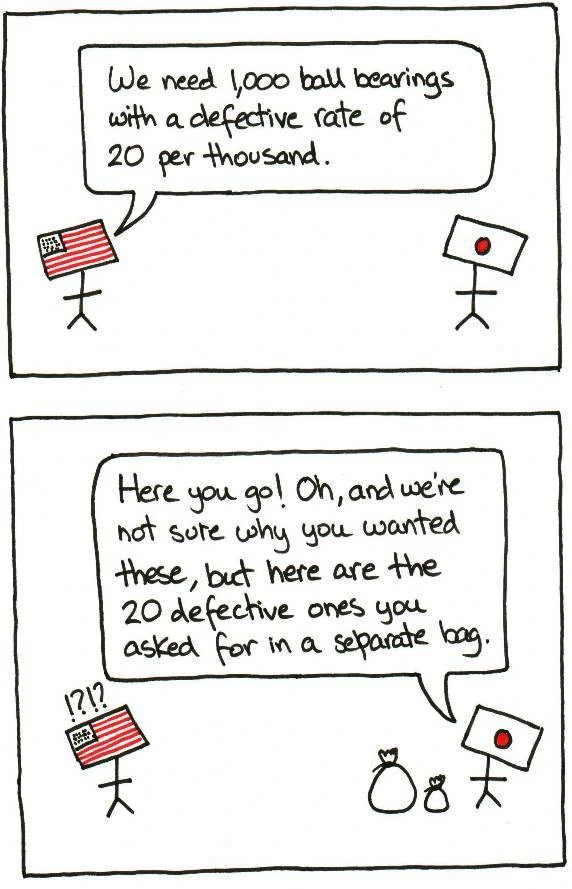I’m reading a book called “Reframing Organizations” by Lee Bolman & Terrence Deal (Jossey-Bass, 2008) for an Organizational Behavior course I’m taking and I came across a hilarious section which refers to an encounter between two companies in the 1970s or 1980s. The first is an American company which needed ball bearings and the second is a Japanese plant that made them.
Here’s what apparently happened:

Although the book’s main point was more about the difference in company standards between both countries, I couldn’t help but map this back to miscommunication in virtual teams.
This nearly always happens. One party sends a request without being descriptive enough, and the other party acts on it without following up.
Here are a couple of lessons learned for both companies that we can all learn from:
American Company: Be explicit with your orders. Elaborating on the request by saying something like “We’d like all those ball bearings to be perfectly shaped, but we’ll be ok if you send us up to 20 defective ones” might have reduced the time to make them.
Japanese Plant: If you’re not too sure about the order, ask before you start working on it. You wasted time making an additional 20 defective ball bearings! Oh, and ease up on the perfectionism, will you?
Update Jan 2016: I recently wrote an Amazon Bestselling book called “Don’t Reply All” that helps teams reduce such miscommunication issues through email

haha 🙂 that is interesting!! kind of like the things i learn in my intb and orga classes 🙂 very intersting! thanks for sharing
That happens so often. Even outside of business, someone will request something and the communication gets a little messed up and so is the result. It’s good to be very clear on what you are saying all the time.
Good post!
I can’t help but feel that the most hilarious part of the story is left out. What did the American company answer? Why would they need the defective bearings indeed? Would they use them for the machines of their best hated customers? Or were they trying to make a point that Japanese suppliers can be as sloppy as the American ones and turn 20 defective bearings per thousand?
The Americans didn’t want any defective bearings! In the manufacturing world, you use a “defective rate” which reflects what you can tolerate in terms of “bad product.” So technically the Americans wanted 1000 perfect ball bearings but they would have been ok with up to 20 of those 1000 that were “bad” (meaning they’ll still pay for the 1000 as if they’re all perfect). However, given that the Japanese are known for their perfectionism, and that they would make 1000 perfect bearings anyway, they didn’t understand the request and made an additional 20 defective ones for the Americans 🙂
>ease up on the perfectionism, will you?
No…that’s one of the great things about this country (Japan)…everyone believes in doing a job right. Completely right.
I was making a facetious comment there 🙂 I’m a perfectionist myself so I appreciate always doing things the right way – keep it up!
Thoroughly enjoyed the article… and that too at the time when I am working on a Japanese customer.
Awesome! Just participated in a seminar this morning on Organizational Change Management and our speaker gave an example of Toyota Manufacturing in Kentucky demanding Japanese defect rates (1/mil) from American suppliers who were accustom to US defect rates (1/250k) . Very timely for me!
“The rest of the story” (~Paul Harvey, RIP) is that Toyota offered to train the US companies on how to meet the new standards; the companies who chose to embrace the change are now more successful for it. Hence, even unexpected change is good!
Very funny 😀 I miss Japan. In my country, Indonesia, they always make mistakes and never apologize. Customers have to fight for their rights. The complete opposite of Japan. Or maybe the whole world is the complete opposite of Japan.